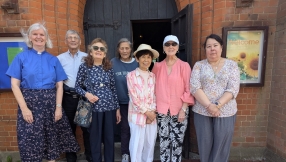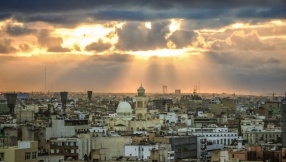
Jewish academic and Hebrew scholar Irene Lancaster reflects offers the Jewish perspective on the consolation of God after the wilderness years of the Exile.
The seven weeks between the 9th of Av (the Fast of Av) and Rosh Hashana (Jewish New Year) span two Hebrew months, Av and Elul. Elul acts as a contemplative, but increasingly joyful prelude to Rosh Hashana, the start of the New Year, which brings new beginnings in the month of Tishrei.
Currently, we are in the second half of the month of Av, when we read the first three of seven Haftorot of Consolation, all taken from the last part of the prophetic book of Isaiah. These are chosen to accompany the last book of the Humash (Pentateuch), known in Hebrew as Devarim (Deuteronomy). This is the book where Moses, knowing that he is about to die on the other side of the Promised Land, recaps the story of the Jewish people, reiterates their aims for now, and promises the blessings they'll accrue on the other side of the Jordan if they follow G-d's directions.
The first Haftorah of Consolation sets the scene with its call: 'Nechamu nechamu' (Isaiah 40:1-26). 'My people', G-d says, 'Comfort yourselves'.
This Haftorah accompanies the Torah reading of Va-Etchanan (Deuteronomy 3:23 - 7:11). These words are read on the Shabbat following the Fast of Av i.e. following the time when we mourn the Destruction of the Temple, as the people were led into Exile.
But now, on Shabbat Nechamu, Isaiah tells the people that the time of Exile has been fulfilled; the people will return to the Land; and the 'nothingness' and 'emptiness' of the nations will become irrelevant (v 17). In fact the word used is 'tohu', from Genesis 1, in which the world before creation was designated as 'formless and void' (tohu ve-bohu). As Israel will be recreated from the ashes of nothingness, so the rest of the world and its huge power will be as nought.
In the accompanying Torah reading from Deuteronomy, Moses repeats the 10 commandments and recites the Shema, the most important prayer in the Jewish liturgy, 'Hear oh Israel, the Lord is One ....' This recitation reminds the people of their past in the Wilderness, and also acts as a guide for their future, without Moses, in the Promised Land. Physical freedom together with spiritual rebirth. But the name of the Torah reading (Va-Etchanan) demonstrates that Moses is still leading the people - they are far from independent: 'And I implored the Lord at that time ...'.
However, entreaties from their leader, Moses, need to be supplemented by the people themselves - every single individual. Therefore, the following Haftorah is called Ekev. This second Torah reading (Deuteronomy 7:12-11:12) starts with a word related to the name 'Jacob'.
Jacob had a very hard life, during which he clung to the 'heel' of his brother Esau and always tried to 'supplant' him. Jacob cheated Esau and was in turn cheated by his father-in-law. Jacob struggled with the angel of Esau before being renamed 'Israel', 'he who wrestles with G-d'. As a result, Jacob's thigh was dislocated, and since then the Jewish people always work with a 'limp' that they have to accept and yet try to overcome.
In the context of our Torah reading, 'ekev' is, however, translated here as 'reward' by a number of prominent rabbinic scholars, including Onkelos and ibn Ezra. 'If you listen to these ordinances, and observe them and practise them', you will be rewarded ....'
What is a heel? It is the lower part of the foot which tramples. Thus, a link is made between 'ekev' and the type of injunctions described in this passage. These are the less obvious commandments, the little things that tend to be despised, overlooked, left unattended, or even 'trampled on'.
Similarly, the Haftorah reading for the day (Isaiah 49:14 - 51:3) signals that Israel feels like a 'heel', an 'ekev'. Like the laws she has abandoned, she herself has also been abandoned by G-d: 'And Zion said: "The Lord has abandoned me, and my Lord has forgotten me."'
G-d's response to Israel is amazing: 'Can a woman forget the baby she is breast-feeding? Can she really withdraw compassion for the child of her womb? And even were these to forget, yet I [G-d] will never forget you.'
Here, in the 8th century BCE, the male prophet, Isaiah, compares G-d to a breast-feeding mother who is inextricably bound to the baby she is feeding, and by doing so, keeping the baby alive. This image is truly potent. Not only has G-d 'created' the Jewish people - so to speak - but, like the eternal mother, He goes on caring for them. The Jewish people will forever remain G-d's children, and the bond will never be broken.
Though there are times of strife, quarrel, and even punishment, just as in human families, G-d will always remember His total bonding with Israel. And the image used is one of a mother with her new-born baby. The implication is that, now that the Exile is at an end, Israel will truly be reborn, and once again feel herself to be first created and then nurtured forever by G-d.
The last words of this Haftorah consist of G-d telling the Jewish people to 'Listen to Me' (Isaiah 51:1), as if He were speaking to a small child. However, the hearing aspect of G-d is transmuted into 'seeing' when we reach the third Haftorah of 'Re-eh (Isaiah 54:11 - 55:1).
In Deuteronomy (11:13 - 16:17), G-d starts off with the words: 'See I [G-d] ... give you today a blessing and a curse ...' How has 'hearing' now become 'seeing'? In Jewish thought, hearing is tied up with obedience. To 'obey' utilizes the same Hebrew word, shema, as to 'hear'. So G-d is still in charge, just as during the first Haftorah of Consolation of Nechamu.
The people are drawing ever closer to G-d. First they experienced unconditional love - 'be comforted'. Next, they listened, obeyed and were no longer Jacob, the 'heel', but had morphed into 'Israel', forever fed and nurtured by G-d. But now, these outside sources have become so 'present' to the Jewish people, that G-d can tell them to 'see', rather than to 'listen'. The Divine becomes as it were 'adjacent' to the people. And then, Isaiah continues, the Jewish people will act as 'a witness to regimes, a prince and a commander to the regimes' (Isaiah 55:4), and even more: 'Behold, you [Israel] will [even] summon a nation that you did not know, and a nation that did not know you will [now] run to you' (Isaiah 55:5).
How can we account for this three-fold rise of the 'afflicted, storm-tossed' exiled Jewish people into a much-admired, sought-after, re-created 'start-up' nation? It all began at rock bottom, with the 9th of Av (the Fast of Av), when the Temples were destroyed, the Land devastated and the people led into Exile. Could they get any lower - despised, tortured and killed by the world?
The process of re-creation starts with Moses 'entreating' G-d on behalf of the Jewish people. Having been comforted by Moses and by Isaiah 40, the people begin to listen and heed G-d's words. They start with the little things, the everyday things, even the things that people don't notice. In paying attention to the little things, they start to regain some idea of self-worth.
At this stage, they gradually become more and more aware of G-d's presence in their own lives and in the surrounding world. This is the state known as 'seeing', which is the main lesson of Parshat Re-eh, accompanied by Isaiah (54:11 - 55:1). No longer are the Jewish people a bedraggled mass of broken and despised individuals. They will become nation, proud to serve G-d and the whole of humanity.
This is Isaiah's great vision for the month of Av, which this year finishes on August 25, the start of the month of Elul, heralding the Haftorah of Shoftim (Isaiah 51:12 - 52:12). 'It is I, I am He Who comforts you' (Isaiah 51:12). 'Wake up, wake up ...' (Isaiah 52:1). Thus, with the advent of Elul, a new spirit arises in the people's perception, which we see expanding in the three remaining of the seven Haftorot of Consolation.
The Talmudic rabbis stated of the olive, a staple food in Israel, that: 'Just as the olive only produces oil after being crushed, so too, Israel finds its purpose through suffering.' So too, many great modern rabbis, including Rav Kook, first Chief Rabbi of Israel, was among those who saw the re-creation of Israel as 'the beginning of the flowering of our redemption', as it was envisioned by the Prophet Isaiah in our current Haftorot of Consolation.
Speaking as a Jew from a Jewish perspective, Jews believe that being 'chosen' by G-d also means that no other people or nation on earth is singled out for such opprobrium like the Jews. However, we interpret this as being just liked the crushed olive - the Jewish people have always somehow sprung back. The many miracles experienced by the Jewish people are due to the fact that they continue to perceive the hand of G-d in their own lives, as well as in world affairs.
The Jewish people stand ready to do their duty, to defend their people, their Torah and their Land; to 'choose life' (Deuteronomy 30:19) rather than death; to remain fertile and happy.













